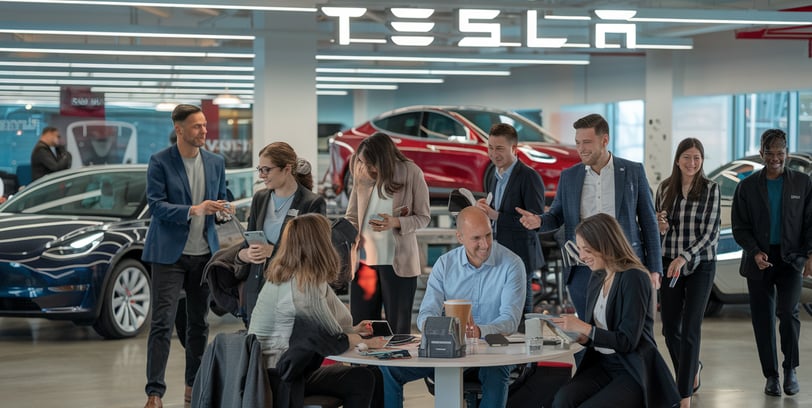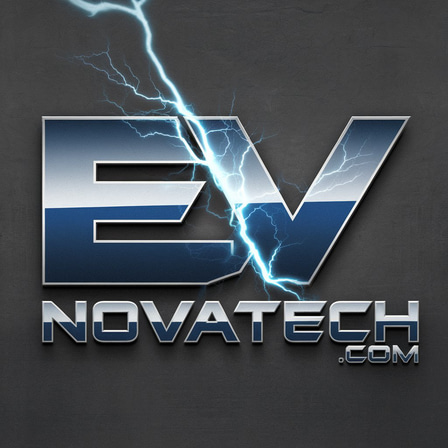"Is Tesla Replacing American Workers with H-1B Employees? The Shocking Truth You Need to Know!"
Explore the recent changes in Tesla's hiring practices as we analyze whether H-1B visa workers are replacing American employees. Discover the implications for the automotive industry and the growing influence of foreign workers at this leading tech company.
BLOG POSTEV CARD LATEST UPDATE EV FUTURE EVS NEWSDAILY INFO
evnovatech.com
12/31/20245 min read


Is Tesla Replacing American Workers with H-1B Workers? The Shocking Truth You Need to Know!
Tesla, the electric vehicle giant that has reshaped the automotive industry, is often at the center of conversations about innovation, sustainability, and technological advancements. But recently, the company has come under scrutiny for something that isn't about self-driving cars or solar panels. Instead, it’s about its hiring practices and the growing number of foreign workers employed through the H-1B visa program. So, is Tesla really replacing American workers with H-1B employees? Let’s dive into the facts, explore what's at play, and uncover the truth behind the headlines.
The H-1B Visa: What’s All the Fuss About?
To understand the debate surrounding Tesla’s hiring practices, we first need to understand the H-1B visa program. This U.S. work visa allows companies to hire foreign workers in specialty occupations—typically in fields like technology, engineering, and sciences—where there is a shortage of qualified American workers. The program is meant to fill gaps in the labor market, but it has also sparked controversy for what some perceive as a way to undercut domestic workers by hiring lower-paid foreign employees.
The H-1B visa has been a source of tension in the tech industry for years. While some argue that it’s necessary to stay competitive globally, others see it as a way for companies to avoid hiring American workers who would demand higher wages and better benefits. The question is: is Tesla part of this trend?
Tesla’s Workforce: A Snapshot
Tesla’s rapid growth and ambitious goals have created a demand for skilled workers. From engineers designing cutting-edge electric vehicles to software developers enhancing the company’s autonomous driving capabilities, the need for top talent is undeniable. Tesla has long been known for its high standards and innovation-driven culture, and it requires employees who can keep up with the pace of change.
A quick glance at Tesla’s workforce reveals a growing trend: foreign workers, many of them employed on H-1B visas, are filling a significant portion of these roles. In fact, several reports have highlighted the fact that Tesla, along with other major tech companies like Google, Amazon, and Microsoft, has increasingly relied on the H-1B program to meet its labor needs.
The Tesla-H-1B Connection: A Deeper Look
Tesla's reliance on foreign workers isn't necessarily a bad thing. In many cases, these workers bring highly specialized skills to the table, skills that are in short supply in the U.S. labor market. For instance, Tesla has hired engineers and software developers from countries like India, China, and Canada, where universities are producing top-tier talent in fields like artificial intelligence and machine learning.
However, the concern arises when we look at the broader implications. Are these foreign workers displacing American workers who could perform the same roles? According to some critics, this is exactly what is happening.
The Growing Controversy
One of the primary criticisms leveled against Tesla (and other companies like it) is the belief that the H-1B program is being used to reduce labor costs. Critics argue that by hiring foreign workers who are willing to accept lower salaries than their American counterparts, Tesla is artificially lowering wages and creating an uneven playing field for American workers. These workers may be skilled and capable, but are they being paid what they deserve?
In some cases, employees on H-1B visas are seen as less likely to negotiate for higher wages or benefits due to their visa status, which makes them more vulnerable to exploitation. As a result, critics argue, American workers are being pushed out of competitive job markets, replaced by employees who are less expensive to hire.
Tesla’s Response to the Allegations
Tesla has responded to these allegations by asserting that its hiring practices are fair and in line with industry standards. The company points out that it has always been committed to creating jobs for Americans and that its reliance on foreign workers is due to the specific skills needed to achieve its ambitious goals. In fact, Elon Musk, the CEO of Tesla, has openly advocated for increased immigration and has stated that talented foreign workers are vital to the success of tech companies in the U.S.
Tesla also highlights the fact that many of its foreign hires are employed in highly specialized fields where American workers simply aren’t available. The company argues that the H-1B visa program is essential for attracting and retaining top talent from around the world.
What’s Really at Play?
So, is Tesla truly replacing American workers with H-1B employees? The answer isn’t as simple as a yes or no. While there are certainly cases where foreign workers are filling roles that could potentially be filled by American workers, it's important to recognize the complexity of the situation. Tesla’s rapid growth and the highly specialized nature of its work means that it often needs talent that simply isn’t available in the U.S. labor market at scale.
That being said, there are valid concerns about the long-term implications of this trend. If American workers are being overlooked in favor of cheaper foreign labor, this could have a detrimental effect on wages, job opportunities, and the overall economy. The key question is whether there is truly a shortage of qualified American workers, or if companies like Tesla are simply using the H-1B program as a way to lower costs.
The Impact on American Workers
The debate over H-1B workers often boils down to one central issue: job displacement. Many American workers feel that their job opportunities are being taken away by foreign nationals who are willing to work for lower wages. This has led to calls for reform of the H-1B visa program, with some advocating for stricter regulations that would ensure American workers have a fair shot at high-paying tech jobs.
However, it’s important to remember that the issue isn’t necessarily about the foreign workers themselves. Rather, it’s about the broader economic forces at play. Is the system structured in such a way that American workers are being left behind, or is there a true shortage of skilled labor in the U.S. that necessitates reliance on the H-1B program?
Conclusion: What’s Next for Tesla and the H-1B Debate?
As Tesla continues to grow and innovate, the question of H-1B workers versus American workers is likely to remain a hot topic. While the company’s reliance on foreign talent is not unique, it highlights a growing trend in the tech industry: the increasing globalization of the workforce.
Ultimately, the solution lies in finding a balance between attracting the best talent from around the world while also ensuring that American workers are given the opportunity to compete for these high-paying jobs. For now, the debate over H-1B workers at Tesla is likely to continue, with both sides of the argument offering valid points. Whether or not this trend continues will depend on the evolution of the H-1B program, and how companies like Tesla navigate the complexities of global talent acquisition.
FAQ
Q: Is Tesla replacing American workers with H-1B workers? A: While some foreign workers are being hired for highly specialized roles, it’s not clear-cut whether American workers are being replaced. Tesla claims that the H-1B program helps the company meet its talent needs due to a shortage of qualified workers in the U.S.
Q: What is the H-1B visa program? A: The H-1B visa program allows U.S. companies to hire foreign workers in specialty occupations, typically in fields like technology, engineering, and sciences.
Q: Why are there concerns about Tesla’s hiring practices? A: Critics argue that Tesla is using the H-1B program to hire foreign workers at lower wages, potentially displacing American workers and lowering overall wage standards in the tech industry.
Q: What is Tesla’s stance on H-1B workers? A: Tesla has defended its use of the H-1B program, stating that it allows the company to hire top talent and meet the growing demand for highly skilled workers in fields like artificial intelligence and electric vehicle design.
Q: What can be done to address the issue? A: Some suggest reforms to the H-1B visa program, ensuring that American workers are given priority for high-paying jobs while still allowing companies to hire foreign talent when necessary.
